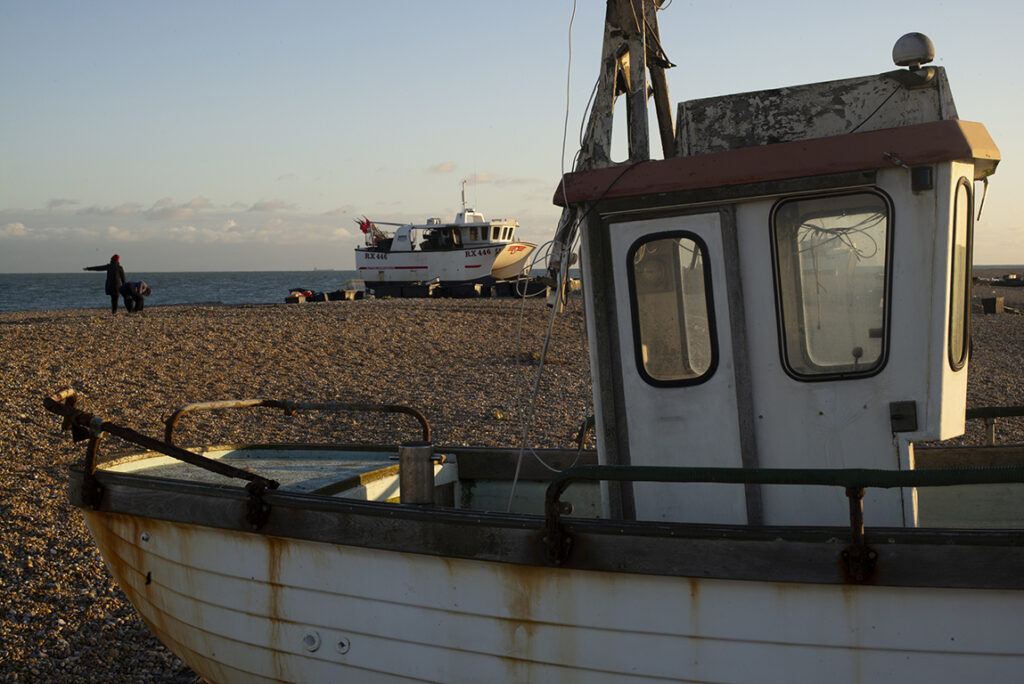
Dungeness has always been a peculiar place. Less a town, more a windswept cluster of low houses set on a thick shingle beach, overshadowed by a nuclear power station and served by a sole, winding road. It’s known as “Britain’s only desert” because of the scrubby shingle that stretches towards the coast. The film director and artist Derek Jarman famously lived out his final years in a cottage on the beach.
It’s also a headland on the Kent peninsula, which protrudes into the English Channel towards France, and one of the shortest crossings. Hundreds of the refugees headed for British shores have ended up on its beach over the summer. Yesterday the area had a record day, with the arrival of around 600 refugees, including babies and small children. Meanwhile, 27 people who were headed this way on 24 November perished as their boat capsized in the Channel.
Today Dungeness is bright, crisp, blustery and freezing cold: only a few have braved the beach. A tourist clutches her hood around her face. “We didn’t plan for this,” she laughs as a gust of icy wind threatens to push her over. Meanwhile, on the Dungeness Estate, The Pilot Inn is doing a roaring trade, serving fish and chips to dozens of older customers who came to “get some air”, but ended up sheltering from the biting wind.

Further onto the beach, two neon-vested men are standing outside the RNLI lifeboat station, with the unenviable job of loading the boats which carried the recently arrived refugees onto a truck. These boats, 10-metre inflatables in hard-to-spot khaki and black, are “top-spec”, says one. Some this summer have been more like “Airfix kits”.

The two men attach the boats to the lowloader before rolling them up like sleeping bags, squeezing the air from them. A sock lies in the bottom of one.
In their small community, Dungeness folk can be “quite tight-lipped”, says a dog walker on the beach, who has brought water and supplies here from her home near Rye. The few businesses in the town are tired of talking to journalists about the crisis. “I keep telling reporters: it’s too political,” says an exasperated worker at one. “I’m not being rude. But we’re a business and people have differing views.”
One of her customers, Michael Brown, is less reluctant. He lives on the beach in nearby Greatstone, and says “hundreds” of migrants have landed in his garden this summer. He is sceptical of the way the new arrivals are being depicted in the media.
He says the people who have landed near his home have been “all young, fighting-age kids”. “They’ve got iPhones, they’ve got everything,” he adds.
“I’ve got friends in Dover with four kids, they can’t even get a council place. Yet the Afghans are coming today and getting housing. How is that right?”
The RNLI is a source of disagreement here. The charity, which is run and staffed by volunteers, has come under fire for what some – Brown included – perceive as helping refugees to arrive in the UK. A sign on the lifeboat station here has “taxi” scrawled across it in black marker.

[See also: How much does the UK government really care about fixing the migrant crisis?]
“Boris [Johnson], the RNLI, will never get any contributions from me ever again – and loads of people are saying the same thing, particularly all down here,” he says, gesturing at the surrounding houses.
“Bearing in mind we live on the coast, so obviously we don’t want people drowning, we want the RNLI doing what it’s supposed to do. But they’re not. They’re going out, picking them up.”
Ian Fraiser, who is fishing with a friend, is more sympathetic. “They have jobs, they have things to do. The number of callouts they have now – and what they see and what they have to experience, they’ve got to keep their life going as well.”
Although Fraiser lives about half an hour away, he says he often comes on holiday to Dungeness. “I’m just fascinated by this place,” he says.
During a recent fishing expedition he witnessed “about 40 migrants coming in”. “You see it more and more and more, certainly over the last three months”.
“You see the lifeboat going out, and because generally they’re so low in the water, you don’t see them until the last minute.”
“The craft are getting bigger. It’s not little ones that come over – it’s 30-seaters.”
As the sun began to sink behind the power station, the two men finally lashed the last of the boats to the truck, and it bumped away from the lifeboat station. “Where are they going?” I asked. The man shrugged. “Usual place.”

[See also: Why the language we use to talk about the refugee crisis matters]





